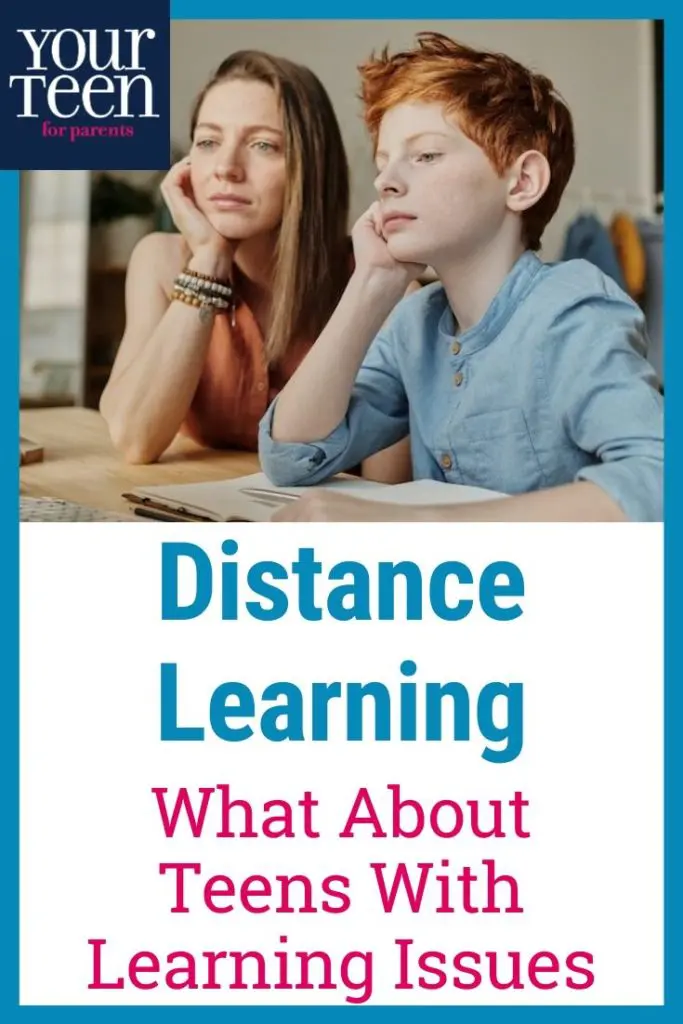While all parents are struggling to help their teens with distance learning, it can be especially daunting for parents of students with learning disabilities or any kind of IEP or 504 plan. I have insider knowledge on this struggle because my own daughter has dyslexia, dyscalculia, and an IEP.

As I help her navigate her workload, I now have an added layer of responsibility. Suddenly, I’m on call all the time: helping my kid figure out the online platform; assisting with notetaking and essay writing; emailing her teachers when accommodations aren’t included in quizzes; and trying to be a calm and patient tutor when my daughter doesn’t understand mitosis.
“It’s a frustrating time for caregivers. Most parents didn’t go to graduate school to become a special education teacher,” says Hadassa Meyers, director of educational services at A+ Solutions based out of Beachwood, Ohio. Her company specializes in psycho-educational testing, psychological counseling, and tutoring services, particularly for students with learning challenges.
| [adrotate banner=”167″] |
Tips for Parents of Teens with Learning Issues
Parents shouldn’t have to go it alone, says Meyers. Here are her top tips for parents of teenagers with learning issues, including ADHD, dyslexia, dyscalculia, and anxiety.
1. Ask for help from their teachers.
Before the school year ends, go straight to the source: Start by asking their teachers how they have helped your student in the classroom, so you know what kind of assistance they’ll need at home. Now is not the time to use Google every time their work confuses them. Instead of you trying to learn the material and teach it to your student, have your student email their teacher for help. This is the perfect time for your teen to learn how to advocate for their needs. Help them with “the ask” a few times, then put them in charge of that communication.
2. Hire a learning intervention specialist.
If you’re not getting the support you need, it may be time to hire a trained intervention specialist. Look for somebody with expertise in special education who is skilled in figuring out what learning interventions will meet your child’s specific needs. One great way to find help is by reaching out to your school’s guidance counselor for recommendations of reputable companies. Make sure whoever you work with only hires professional teachers. You’ll also need to take your child’s personality into consideration: Do they need someone with an outgoing personality, or someone with a calm, quiet presence? Make sure you’ll have the option to ask for a different tutor after a few sessions if the first match isn’t ideal.
3. Track their learning.
Think about what your student could typically complete in the classroom, perhaps by looking at a few of their completed assignments. Then keep track of how they do or don’t progress with online learning. As parents of kids with learning issues, we know we have to document how our students are doing so they can get the help they need from schools. When school starts back up, we can use this data collection to let our child’s school know how they have progressed or regressed, so the school can adjust their IEP or resources accordingly.
4. Use summertime to prepare for next fall.
We all know these months of distance learning have not replicated in-school learning. It’s important that we use this summer to practice the skills they will need for a successful re-entry this fall. Check the department of education website for your state for grade level standards by subject. You may want to hire a professional tutor for guidance on what skills your student should have mastered before moving on to the next grade.
Overall, the best advice is to remember that your primary role is to be mom or dad, not professional educator. A parent’s job is making sure their teenager is physically and mentally healthy, so they are able to learn. We don’t need to know how to find the slope of a line for math class, but we do need to be a supportive cheerleader for our teenagers.

And, since we know our students best, we also get to prioritize what is best for them right now. Sometimes that will mean having them take a break from distance learning on Tuesday to ensure they have the capacity to learn on Wednesday.
From Your Teen for A+ Solutions Educational and Psychological Services, finding solutions to life’s challenges. Learn more at thinkaplus.com.





